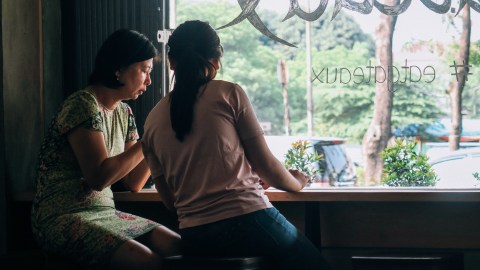Why mothers of tweens – not babies – are the most depressed

Photo by Farrel Nobel on Unsplash
The joys of motherhood quite literally wax and wane over time.
If you had to guess, you might think that one of the most trying times for mothers is bringing home a new baby, given the sleep deprivation and the adjustment that comes with taking care of an infant. But some might be surprised to learn that our latest research shows the most challenging period of mothering comes during children’s middle-school years.
We studied more than 2,200 mostly well-educated mothers with children ranging from infants to adults, and examined multiple aspects of mothers’ personal wellbeing, parenting and perceptions of their children. Our findings show an inverted-V shape in feelings of stress and depression, with mothers of middle-school children (‘tweens’ aged 11 or 12) consistently faring the most poorly, and mothers of infants and adult children doing the best.
As it turns out, despite the exhaustion and feelings of overload during the infancy period, mothers experience a great deal of satisfaction and fulfilment in caring for their babies. But as puberty approaches, mothers find less and less positivity in interactions with their children, and the challenges of parenting become far more complex.
From the perspective of mothers, there’s a great deal of truth to the saying: ‘Little kids, little problems; big kids, big problems.’ During the tween years, several factors come together in a perfect storm. One, the kids are dealing with puberty and all that this implies – hormones, acne and changing bodies on the one hand and, on the other, the draw toward experimenting with alcohol, drugs or sex. Children are also coping with the transition to a relatively impersonal school environment, with large buildings and different teachers for each class, as well as the increasing academic and extracurricular pressures – think standardised testing and college preparation (yes, it starts that early, now!). Finally, children this age are starting to figure out who they are, separating from their parents and looking toward their peer group for acceptance. This often comes with testing limits, as well as starting to take risks.
That is an enormous amount of change to deal with simultaneously. And as children struggle to negotiate all of these major challenges, so too must their mothers as primary caregivers.
Mothers are essentially the ‘first responders’ to children’s distress, and now they must figure out how best to offer comfort and reassurance, as the old ways – hugs, loving words and bedtime stories – no longer work. They also have to walk a very fine line in setting limits. Decisions about what to allow and where to draw the line bring confusion and even fearfulness. We want our children to talk to us about everything and to be supportive, but worry about how to do that without seeming to condone bad or dangerous stuff. Even for confident mothers, it’s a time of second-guessing ourselves, worrying about whether we made the right judgment calls, and feeling guilty about the firm stands that we do take.
And then, of course, mothers face the often-drastic change in the child’s persona, as behaviours in everyday interactions can change rapidly from one day to the next. The adoring, happy first-grader is morphing into an unpredictably sullen adolescent: affectionate and thoughtful one day, and implacably closed-off the next.
That tweens roll their eyes at their parents is not news. What is new is evidence, in our study, that these behaviours can be deeply hurtful to mothers. Women who saw their children as rude and rejecting were among those who felt most distressed.
A central take-home message from our findings is that the big ‘separation’ from offspring, the one that really hurts, comes not when children leave the nest literally, but when they do this psychologically – in their complex strivings to become grown-ups, in their tweens.
On top of the emotional strain, the tween years also come with rising demands on time and energy, particularly for relatively well-educated mothers. In terms of sheer number of hours, college-educated mothers spent increasingly more time on their children’s extracurricular activities compared with well-educated fathers, or less well-educated mothers. Besides the time, there is the huge psychological toll associated with planning, organising, attending and travelling to and from events, often with inflexible deadlines, and often for more than one child on a given day.
And all this comes at a time when many mothers first experience the signs of approaching middle age, with declines in physical and cognitive abilities, and increased awareness of mortality. It also is a period when, according to studies other than our own, marital satisfaction is the lowest and strife the highest.
It’s no wonder that middle-school mothers are so stressed.
To cope with the coming onslaught, they must be prepared, and books and online resources can certainly help. But middle-school mothers must also refuel themselves through close, reliable, authentic friendships. In an earlier study, we showed the strong protective potential of these relationships in buffering women through the challenges of motherhood. So mothers should treat it as an imperative, and not an option, to connect with supportive friends, and stick with this resolve especially during the middle-school years. They should use each other as sounding boards. Reach out when feeling frail or exhausted, or just plain fed up. And have fun together.
Finally, as mothers work through middle school, they can take heart: it does indeed get easier. Middle-schoolers become high-schoolers, and then adults, and our data clearly show that the happiest mothers are those whose children have grown into adulthood. The ’empty nest’ is largely a myth. It also helps to remember this constantly (seriously, put a sticky on the refrigerator if you must): we’re not just caregivers. We’re people too. 
Lucia Ciciolla & Suniya Luthar
This article was originally published at Aeon and has been republished under Creative Commons.





